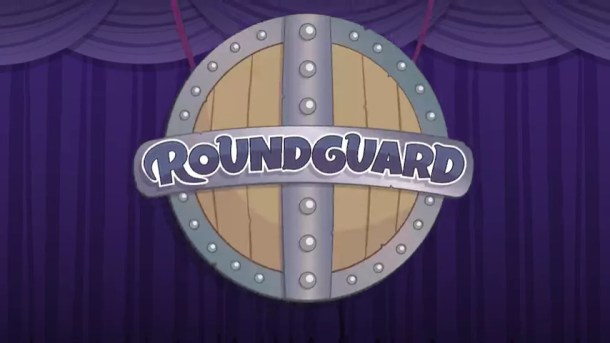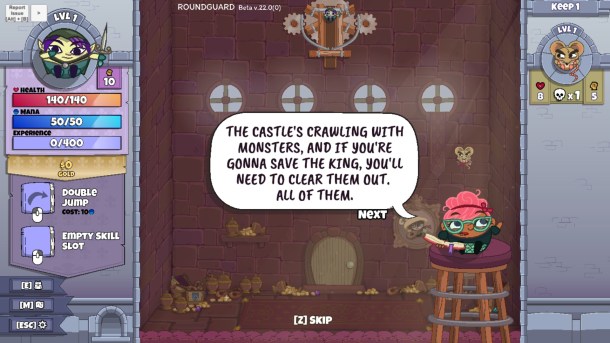So I was recently asked to check out the September beta build of Roundguard, a casual launcher, pinball styled game from a fledgling developer group. Although similar to other games of this oversaturated genre, Roundguard adds a bit of innovation that may just allow it to stand out from the crowd.
Not much in the way of plot, Roundguard is an “adventure” full of knocking into baddies and gathering as much gold as possible. Supposedly, you’re actually trying to retake a castle, swarmed by enemies, and recovering the gold for deposed king. While lacking any kind of proper narrative, there is a bit of humor mixed in with the fast-paced gameplay.
And that’s what Roundguard is really all about; it’s gameplay. Roundguard is a launcher-styled casual game that wouldn’t look out of place among the many others on Steam and mobile platforms. Basically, you launch your chosen character at the enemies to defeat them. After some pinball physics and once all enemies are defeated, you move onto the next level and repeat the process.
Nonetheless, what makes this game unique is its use of RPG mechanics such as experience gains, leveling up, its vast set of items and equipment, and, especially, skills that take gameplay beyond the standard formula of launch-and-watch. While action is mostly as random as one would expect after aiming and launching your character into the fray, there is a bit of strategy that’s needed to accomplish the goal of defeating all the enemies in a level. Each starting character has a set HP, Mana, and attack value that improves as items and level ups are gained. When your character hits an enemy, it will damage that enemy’s HP according to your attack value. But, enemies also have their own attacks, so as you do direct damage, you take it too. Later enemies will also inflict effects and together, this is where items are especially important, as improving your HP, adding effects like recovery, and inflicting your own effects, such as poison or bleed, can mean the difference between surviving and failing.
Perhaps the biggest game-changers are skills. Each of the three starting characters/ classes has a skill that changes the way they attack and more skills can be gained during play. For example, the rogue may start with a skill called double-jump. Once launched, double-jump serves as mini launch, in which you can take aim right where you are in the field of play and launch the character in a chosen direction. As long as you have enough Mana, this and all other skills can be used over and over. Another skill is the arrow shot, in which your character can fire an arrow at a distant enemy, allowing you to avoid direct contact and damage. These skills also have upgraded variations that may become available as rewards in later levels, so choosing the right skills and using them effectively can vastly alter gameplay.
As for its overall execution, gameplay is satisfactory in what it sets out to achieve. Learning how to play is done through simple tutorials and controls are kept simple for quick mastery. The randomness of pinball mechanics will mostly dictate how well or poorly you do, as well as how you use your skills during a launch to change the odds in your favor. The frequency of collecting bonuses, cash, items, and skills give the intended impressions of accomplishment and senses of reward, similar to casino slots, freemium, and the like that are meant to entice continued play. It does this very well. And, the more you play, the more experience and hold-over items you acquire, giving you better chances of greater success and higher scores every subsequent playthrough. The only issue I ran into as I played this beta build is non-frequent lag and hang-up during some launches. This could interfere in the timing and aiming of skills for some, but it was never drawn out or significant enough to make or break the success of completing a level. Other than that, gameplay is solid and fans of this style of play will definitely enjoy it once the final product is released.
As for its visual aesthetics, Roundguard implements a cartoon-y art style that matches its casual tone. The medieval styling of its characters, enemies, and levels also pair nicely with the elements of fantasy and treasure hunting the game intends. It’s colorful, inviting, and kid-friendly. The audio also serves its purpose of emphasizing elements on screen and the music, while limited in its offerings, also fits well with gameplay.
Roundguard solidly achieves what it sets out to do, in that it’s quick to start playing, amusing enough overall, and can hold your attention for as long as you let it. Many will find this a mindless waste of time, which can be good or bad depending on whether you’re a fan of this genre. Build quality is mostly there, with a few lagging moments, but no crashes or game-breaking bugs that I encountered. With more interactivity than just launching and watching, Roundguard has a fair chance of distinguishing itself in an overcrowded sea of casual launcher/ pinball games.







